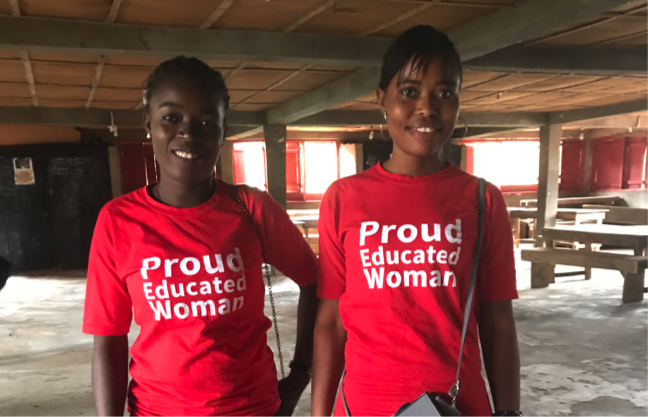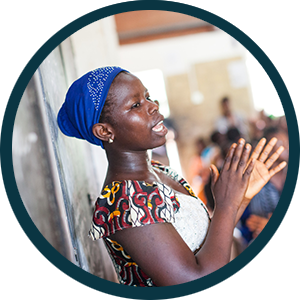Top Global Teachers
How much time should 4 to 18-year-olds spend at school during a calendar year?
(Contribution to the Global Teacher Blog Series) Gosh, what a difficult question! The answer so depends on where you will be when you are not in school. When talking to youngsters in the UK about our youngsters in Sierra Leone, I often find myself saying, ‘…but please don’t imagine that if they can’t go to…
Read MoreHow are your classrooms teaching the skills to resolve tensions and conflicts so as to find the “common ground” in an increasingly diverse world?
A contribution to the Top Global Teacher Bloggers 2018 Series How are your classrooms teaching the skills to resolve tensions and conflicts so as to find the “common ground” in an increasingly diverse world? What an important question at a time when the world rhetoric seems to be about ‘divide and rule’, finding and exaggerating…
Read MoreMiriam’s First Academic Article Published!
As many of you may know, our Country Director, Miriam Mason is working towards her PhD at the University of Durham. Unsurprisingly, her research relates to training teachers in Sierra Leone, a topic close to all of our hearts. As Miriam’s research has progressed, there are a number of academic articles relating to her work…
Read MoreLiteracy Skills for Sierra Leone in 21st Century
To what extent do you believe the literacy skills required for a new world will be more or less the same as they were before? Will new literate practices need to be generated and does that mean that new literacies be required? If so, what do you think these new literacies will be and how…
Read MoreWhat kind of teachers will continue to flourish in the Fourth Industrial Revolution?
A contribution to the Global Teacher Blog Series Photo by Olivia Acland The Fourth Industrial Revolution is reaching Sub-Saharan Africa in bits and pieces. The consequences of the Fourth Industrial Revolution reaching the rest of the world are more likely how we will experience it more and more before we, ourselves, start really engaging with…
Read MoreA Holistic Learning Approach for All the World’s Students in the Fourth Industrial Revolution
What should an holistic approach to learning look like and how do we shift the focus from the accountability measures in existence now to ones that are relevant for all students in a changing world? Please share specific case studies/examples from your classrooms, schools and communities that can inspire the rest of the world. A…
Read MoreTaking Climate Change Seriously in our Schools. What are your best Tips for Teaching About Climate Change in Your Classroom?
Taking Climate Change Seriously in our Schools. What are your best Tips for Teaching About Climate Change in Your Classroom? Contribution to the Global Teacher Series 2018 Strangely, and somewhat frustratingly, it has been quite difficult over the years to get our students in Sierra Leone to think about taking their part in protecting the…
Read MoreHow are you promoting well-being, health and happiness in your classrooms?
How are you promoting well-being, health and happiness in your classrooms? Contribution to The Global Teacher Series 2018 The Battle For The Mind Physical and emotional safety are usually pre-requisites to us being willing to take risks. Risk-taking is usually a pre-requisite for trial and error leading to healthy growth and development. As a…
Read MoreWhat careers advice would you provide to those entering the workforce in 2030?
What careers advice would you provide to those entering the workforce in 2030? Contribution to discussions for the Global Education & Skills Forum 2018: ‘How do we prepare young people for the world of 2030 and beyond?’ The world has been changing exponentially quickly over the last decade plus and is unlikely to stop doing…
Read MoreHow do we instil a better idea of risk taking and struggle in students?
This post is from the Top Global Teachers blog series. Find out more at www.cmrubinworld.com The western world is moving towards lifestyles that require less and less resilience. Physical hardship for many children is becoming a rarity as western parents live up to their dreams of making their children’s childhoods free from suffering. These parents find…
Read MoreDo you believe the curriculum needs to be more relevant for a 21st century world?
Do you believe the curriculum needs to be more relevant for a 21st century world? If you had the power to change the school curriculum, what would you change? Part of the Top Global Teacher Blog Series Prince Ea’s ‘The People vs the School System’ video nearly says it all! The curriculum, the assessment system…
Read MoreIN A 21st CENTURY WORLD, TEACHER LEARNING NEVER STOPS
IN A 21st CENTURY WORLD, TEACHER LEARNING NEVER STOPS —Technology is quickly and forever changing. The moment teachers master one new piece of ed-tech, there may be something newer you need to know more about. Teachers attend professional development sessions of all kinds. If you were calling the shots, how would you change ongoing…
Read MoreExploring Genius Time in Schools
Companies like Google allow employees to spend “20% time” – that is 20% of their time working independently (on concepts they think will most benefit Google) – the goal being to inspire creativity and innovation. Some significant advances have happened and “20% products” include the development of Google News, Gmail, and AdSense. How could this…
Read MoreHow important is teaching ethics in the classroom? How do we instil a moral compass in every student?
When we teach, we are the catalysts for the development of the next generation. As Helen Caldicot said, ‘Teachers are the most responsible and important members of society because their professional efforts affect the fate of the earth.’ There are of course the reductionist and utilitarian approaches that see education as preparation for jobs but…
Read MoreHow to we teach young people the rigorous critical thinking and research skills to distinguish news from propaganda?
How do we ensure the next generation is one which communicates civically, values honesty and recognises reality? Most of our students are accessing education in their third language, having been raised in one of the wealth of local languages as small children, acquiring the lingua franca Krio as they meet others from other language groups…
Read MoreWhat is the best gift you would recommend for your students this holiday season?
All across the western world, children are excited about the coming of Santa, about the different promises of gifts and goodies due at Christmas. The deeper message of Christmas, being one of self-giving, comes with a significant contradiction and clash with the materialistic preoccupations of most at this time. New Year too offers the opportunity…
Read MoreHow do you as teachers support children who are confused or frightened by events going on in their world?
When it’s ‘all going crazy’ out there, what are we to do, as educators? We have to provide an alternative rhetoric, other ways of seeing and doing things. To quote the American First Lady, ‘When they go low, we go high!’ When the rhetoric around us is full of hatred and vitriol, scorn and derision,…
Read MoreHow do we better engender a healthy, happy, and productive school environment where both teachers and students can flourish?
The EducAid vision: A dignified and democratic Sierra Leone where poverty is eliminated by educated citizens! It is difficult to create a productive school environment without a clear vision so, for us in EducAid, this is our starting point; we are ready to be as radical as we need to be in order to achieve…
Read MoreHow can we maximise the value of art and music in education and how can it be blended with more traditional subjects?
“The greatest scientists are artists as well.” – Albert Einstein One of the most difficult battles in education in Sierra Leone is to get parents and students to understand the vital importance of art and the creative subjects within the curriculum. In the Sierra Leonean context I would say that it is hard to…
Read MoreHow do you help students accept and work well with people of different beliefs, cultures, languages, socio-economic statuses, education backgrounds, and learning styles?
Sierra Leone is composed of 17 major tribal groups, all speaking different languages. Muslims make up the majority of the population, but Christians account for approximately 30% of the population. There are not so many foreigners from other African countries: a few Liberians and the occasional Guinean who have ended up in Sierra Leone, but…
Read More
